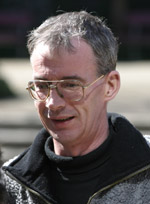|
The |
|
|
|
|
|
The lawyers for convicted
childcare worker Peter Ellis are seeking a royal commission of inquiry into
the case. Ellis was convicted in 1993 of sexually
molesting children at the Christchurch Civic Creche where he worked. One of
the seven preschoolers he was found guilty of abusing later retracted the
allegations and three of Ellis' convictions have since been quashed. Ellis, who has always maintained
his innocence and is fighting to clear his name, served two-thirds of a
10-year jail sentence. Ellis' lawyer Judith Ablett-Kerr
has sent a letter to Justice Minister Annette King requesting a meeting to
discuss the formation of a royal commission of inquiry, said a spokesman from
her office. Ms Ablett-Kerr is also still
working on a petition to take the case to the Privy Council. It may be one of the last New
Zealand cases heard there. The right for New Zealanders to
appeal to the Privy Council was abolished from January 1, 2004, with the
establishment of the Supreme Court. Appeals can still be made in cases
where the Court of Appeal made its final judgment or decision before that
date. Fresh doubts about the evidential
interviews of children in the case were cast last year in research findings
by Otago University academic Professor Harlene Hayne. Professor Hayne said there was a
"strong risk" that the evidence of children who told of sexual
abuse by Ellis was contaminated by the way the interviews were held. She urged the courts to consider
the case again. After Ellis' High Court trial and
two failed Appeals Court hearings, a ministerial inquiry conducted by former
Chief Justice Sir Thomas Eichelbaum in 2000 found the interviewing of the
children was appropriate and had not been undermined or contaminated. But after analysing hundreds of
pages of verbatim transcripts of the pre-trial interviews with the very young
children involved in the Christchurch creche case and comparing them with a
very similar American case, Professor Haynes has taken issue with Sir Thomas'
conclusions. She found the Christchurch
children were each subjected to an average 400 questions by Social Welfare
Department specialist staff, compared with 200 in the American case. In the American case a daycare
worker was released after an appeal to the Supreme Court, which found the
children's interviews were "highly improper", with interviewers
using "coercive and unduly suggestive methods". |

